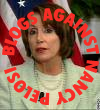I like to pop over to CNN.com once in awhile and submit so that "MY Voice is Heard" (unhunh). As much enjoyment one may get clicking on their choice, I often am perplexed or find the query wanting.
Here's today's:
Have President Bush's four recent speeches on Iraq changed your views about the war?
Yes or No
Are we to assume from this in depth "QUICKIE" that 9% more now believe it was the right thing to do? Or do we assume the other way around? What will CNN assume?
Personally, I would think this indicates 9% more believe it was the right thing to do since you wouldn't think his "pro" speeches would change someones mind if they agreed with him before. No?
Now, I realize these are in no way shape or form scientific. On that thought, how is it that polls are "scientific?" Polls are one thing, but they tend to be such a driving force. One thing that often peeves me is articles written based upon the results of this or that poll. Is that the sign of a really slow/weak news day? Not enough death and/or mayhem?
One of my favourites recently was taken by CNN/USA Today/Gallup. If I'm not mistaken (or forgotten), it was after Bush spoke about the 35 page or so plan for "Victory in Iraq." They took the poll of 1,006 people (how is 1,006 representative, must be the "scientifc" part), to see if his speech had swayed anyone. According to the article only 10% of respondants actually watched the speech.
Doesn't this lack of viewership then negate the results of the poll or the poll in general? Hasn't it somehow lost, what, if any necessity it once had? Isn't it then absolutely ludicrous to then devote an article to the subject? I suppose they could have written that it was a waste of time, but they didn't. They somehow devined results and it's deep meaning nontheless.
Did they have the results/meaning written prior to the poll?
"How did it come to pass that an opposition's measure of a president's foreign policy was all or nothing, success or "failure"? The answer is that the political absolutism now normal in Washington arrived at the moment--Nov. 7, 2000--that our politics subordinated even a war against terror to seizing the office of the presidency." - Daniel Henninger - WSJ 11/18/05
------------------------------------------------
------------------------------------------------
"the slovenliness of our language makes it easier for us to have foolish thoughts." - George Orwell
------------------------------------------------
------------------------------------------------
Wednesday, December 14, 2005
CNN QuickVote
Posted by a.k.a. Blandly Urbane at 5:19:00 PM
CNN QuickVote
2005-12-14T17:19:00-07:00
a.k.a. Blandly Urbane
Subscribe to:
Comment Feed (RSS)





















